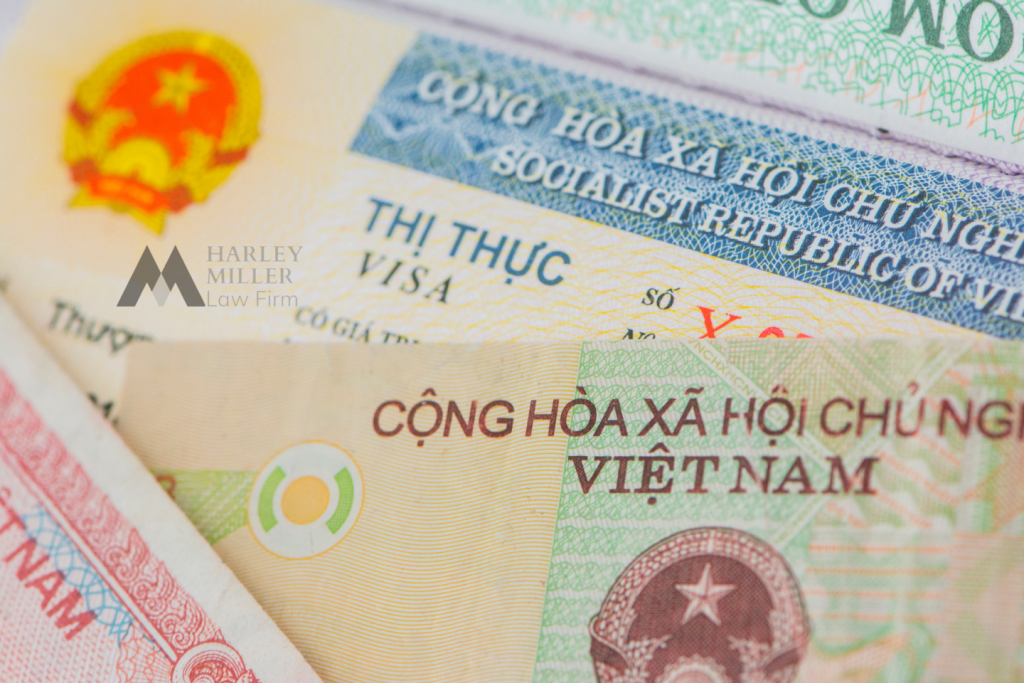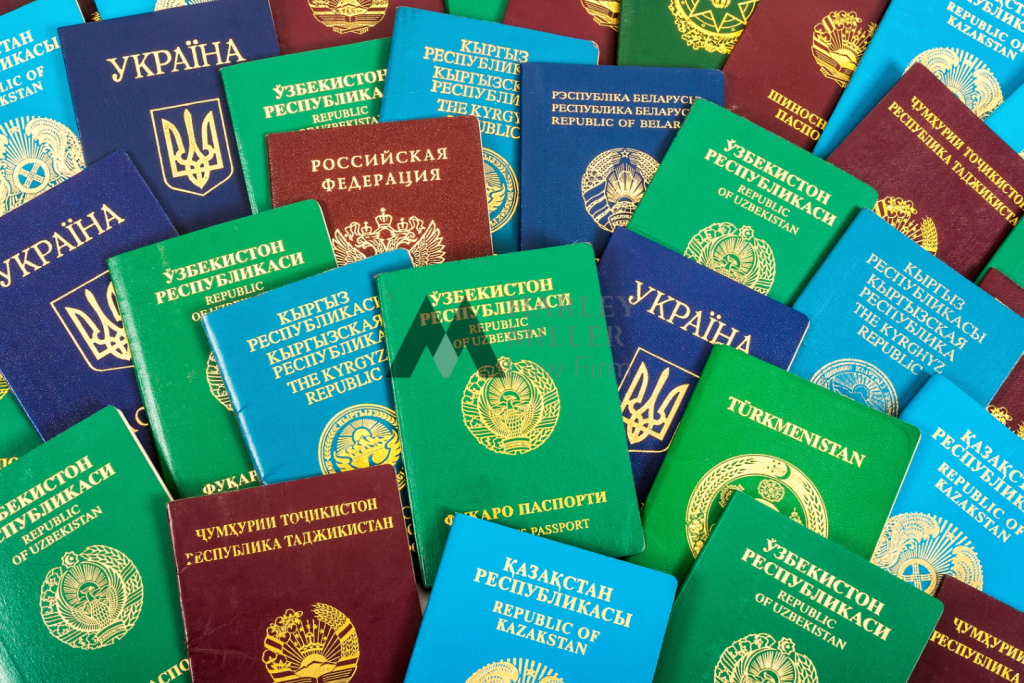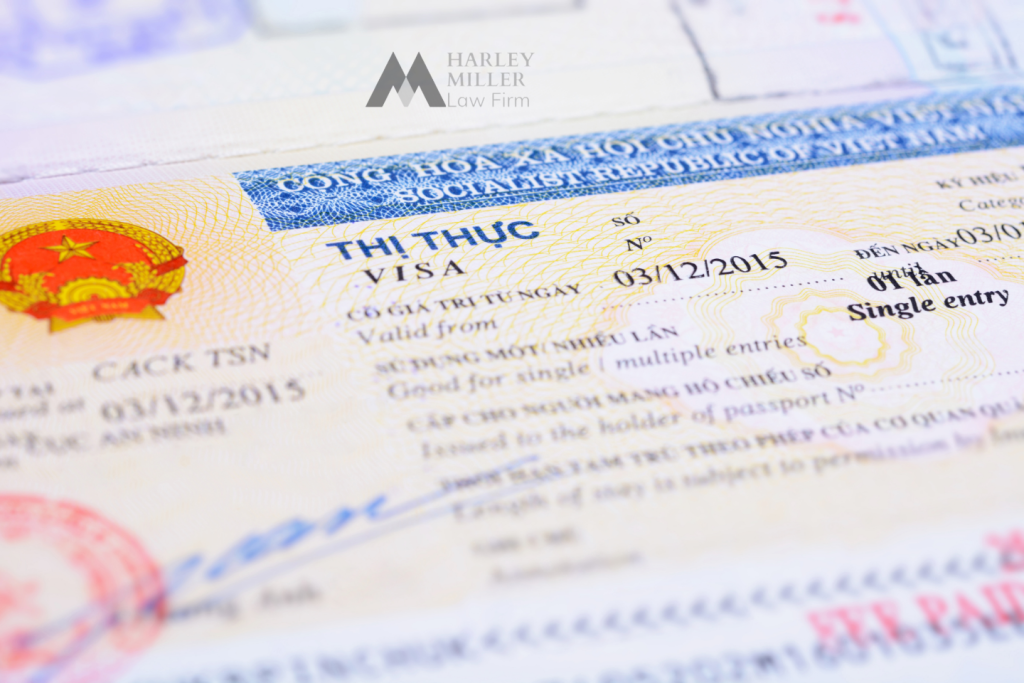Vietnam has become an attractive destination for foreign workers seeking job opportunities and career growth. As the country continues to experience rapid economic growth, the need for skilled professionals from overseas has increased significantly. However, before embarking on the journey to work in Vietnam, foreign nationals must navigate the intricacies of the visa application process. This article aims to provide a comprehensive guide on obtaining a work visa in Vietnam, discussing the necessary requirements, procedures, and important considerations for foreign workers. Whether you are an aspiring employee or an employer seeking to hire international talents, understanding the visa process in Vietnam is crucial for a smooth transition and successful work experience.
Overview
Foreigners after get an Work Permit, they still have to apply for a Working Visa (WV). In some cases, the foreigner can also apply for a Temporary Card (TRC), allowing him/her to enter Vietnam. Single entry or multi-entry Visas shall be granted to foreigners from 30 days to 5 years, depending on the type of Visa. E-visas are issued to the citizens of 80 countries and for a single entry, it can valid for 30-day. The online application is not complicated.
Visa exemption
In some cases, foreigners are exempt from the visa requirement:
1. Foreigners who come to checkpoint economic zones shall have temporary stay in Vietnam for up to 15 days. Likewise, foreigners who come to special administrative-economic units shall have temporary stay in Vietnam for up to 30 days.
2. The Government has not yet issued any Decree on the matter, but they shall grant visa-free entry to Vietnamese people residing overseas who have passports or laissez-passers issued by foreign authorities, as well as to foreigners who are their spouses or children, or spouses and children of Vietnam citizens. However, guidance on how to implement these exemptions is still pending.
3. Foreigners possessing Permanent Residence Cards (PRC) and Temporary Residence Cards (TRC) are not required to apply for a visa when entering or exiting Vietnam, as these cards hold the same validity as a visa.
4. Visa exemption depends on bilateral international agreements to which Vietnam is a signatory. Currently, Vietnam has signed visa exemption agreements with 87 countries which there are in force.
5. Citizens of the following countries (Germany, France, Italy, Spain, UK and Northern Ireland, Russian Federation, Japan, Korea, Denmark, Sweden, Norway, Finland, and Belarus) are eligible for visa exemption when they enter Vietnam. They can stay for up to 15 days from the date of entry, regardless of passport type or purpose of entry, as long as they meet all the conditions prescribed by Vietnamese law.
Note:
It is important to note that this type of visa exemption has a specific duration and can be changed by the Vietnamese Government. The visa exemption policy for citizens of these countries when entering Vietnam will be in effect for 3 years, from 15th March 2022 to 14th March 2025. The policy will undergo regular review and may be extended in accordance with Vietnamese law regulations.
It is important to note that the purpose of entry cannot be changed once a foreigner enters Vietnam under a visa exemption. If a foreign workers wishes to obtain a working visa, they must exit Vietnam and apply for a working visa separately. The application for a working visa also requires a valid work permit.

Signal of Visa
There are 27 symbols of a visa pursuant to the purpose of the foreigners entering Vietnam as follows:
(1) LĐ 1
A confirmation issued to foreign nationals working in Vietnam stating that they are exempt from obtaining a work permit.
(2) LĐ 2
A Working Visa issued to foreign workers in Vietnam who are required to have a work permit.
(3) LS
Issued to foreign lawyers practicing in Vietnam.
(4) ĐT 1
Issued to foreign investors in Vietnam and representatives of foreign organizations investing in Vietnam with a contributed capital of VND 100 billion or more, or investing in government-defined investment-preferred industries or trades and localities.
(5) ĐT 2
Issued to foreign investors in Vietnam and representatives of foreign organizations investing in Vietnam with a contributed capital of VND 50 billion or less than VND 100 billion, or investing in industries or professions that encourage investment, as determined by the government.
(6) ĐT 3
Issued to foreign investors in Vietnam and representatives of foreign organizations investing in Vietnam with a contributed capital ranging from VND 3 billion to less than VND 50 billion.
(7) ĐT 4
Issued to foreign investors in Vietnam and representatives of foreign organizations investing in Vietnam with a contributed capital of less than VND 3 billion.
(8) DN 1
Issued to individuals coming to work with companies in Vietnam.
(9) DN 2
Issued to foreigners for offering services, establishing a commercial presence, and performing other activities under international treaties to which Vietnam is a signatory.
(10) DL
Issued to tourists.
(11) TT
Issued to foreigners who are parents, spouses, and children under 18 years of age of foreigners holding LV1, LV2, ĐT 1, ĐT 2, ĐT 3, NN1, NN2, DH, PV1, LĐ 1, LĐ 2 visas, or foreigners who are parents, spouses, and children of Vietnamese citizens.
(12) NN1
Issued to chiefs of representative offices or projects of international organizations and foreign non-governmental organizations in Vietnam.
(13) NN2
Issued to chiefs of representative offices, branches of foreign traders, and representative offices of other foreign economic, cultural, and professional organizations in Vietnam.
(14) NN3
Issued to individuals coming to work with foreign non-governmental organizations based in Vietnam, representative offices, branches of foreign traders, and representative offices of other foreign economic, cultural, and professional organizations in Vietnam.
(15) LV1
Issued to individuals coming to work with units affiliated with Vietnam’s Communist Party, the National Assembly, the Government, Central Committee of Vietnamese Fatherland Front, the People’s Supreme Court, the People’s Supreme Procuracy, State Audit Agency, Ministries, ministerial agencies, Governmental agencies, the People’s Councils, and the People’s Committees of provinces.
(16) LV2
Issued to individuals coming to work with socio-political organizations, social organizations, and the Vietnam Chamber of Commerce and Industry.
(17) HN
Issued to individuals coming to attend conventions or conferences.
(18) NG1
Issued to members of delegations invited by the Secretary General of Vietnam’s Communist Party or the President of Vietnam, the President of the National Assembly, or the Prime Minister.
(19) NG2
Issued to members of delegations invited by standing members of the Secretariat of Vietnam’s Communist Party, Deputy President of Vietnam, Deputy President of the National Assembly, Deputy Prime Minister, President of Vietnamese Fatherland Front, Executive Judge of the Supreme Court, Chief Procurator of the Supreme Procuracy, State Auditor General, or members of delegations at the same levels as Ministers, Secretary Generals of Provincial Communist Authorities, President of the People’s Committees of provinces.
(20) NG3
Issued to members of diplomatic missions, consular offices, representative offices of international organizations affiliated with the UN, and representative offices of intergovernmental organizations, as well as their spouses, children under 18 years of age, and housemaids during their term of office.
(21) NG4
Issued to individuals working for diplomatic representative offices, consular offices, representative offices of international organizations belonging to the United Nations or intergovernmental organizations, as well as their spouses, children under 18 years of age accompanying them, or visitors to members of diplomatic representative offices, consular offices, representative offices of international organizations belonging to the UN or intergovernmental organizations.
(22) DH
Issued to individuals coming to study or serve an internship.
(23) PV1
Issued to journalists who have permanent residences in Vietnam.
(24) PV2
Issued to journalists who come to work for a short period of time in Vietnam.
(25) VR
Issued to individuals coming to visit their relatives or for other purposes.
(26) SQ
Issued to foreigners for the purpose of market survey, tourism, visiting relatives, or medical treatment in certain special cases.
(27) EV
Electronic visa.

Validity and duration of a visa
The duration of LĐ 1 and LĐ 2 visas, which are issued to persons coming to work in Vietnam, is restricted to a maximum of 02 years. In contrast, LS, ĐT 1, and ĐT 2 visas, granted to foreign investors and lawyers practicing in Vietnam, have a maximum validity of 05 years. The ĐT 3 visa remains valid for a period of up to 3 years, whereas the SQ and EV visas have a maximum limit of 30 days. The authorities issued HN and DL visas for a duration not exceeding 03 months, whilst a VR visa permits a stay of up to 06 months.
NG1, NG2, NG3, NG4, LV1, LV2, ĐT 4, DN1, DN2, NN1, NN2, NN3, DH, PV1, PV2, and TT visas have a maximum duration of 12 months.
Typically, authorities align temporary residence permits with the duration of the visa and can affix them to the passport or issue them separately. Moreover, foreigners can grant permission to temporarily reside in Vietnam during the designated temporary residence period.
Application of Visa
To apply for a visa, foreigners must submit the following documents: a visa application form, a valid passport, and supporting documents that indicate the purpose of entry. These supporting documents may include evidence of investment in Vietnam, in addition to a lawyer practice license for an LS visa, and a work permit or work permit exemption for an LĐ 1 or LĐ 2 visa. Furthermore, they may also require a written acceptance letter from an educational institution for a DH visa.
One of the requirements for visa issuance is that the applicant’s passport must remain valid for at least 30 days after the requested visa expires. The appropriate Vietnam visa-issuing authorities located in foreign countries, such as the Diplomatic Missions of Vietnam, can obtain visas.
Certain restricted cases allow for visa issuance at border checkpoints through Visa on arrival. These cases include:
+ Individuals departing from a country without a Vietnamese visa-issuing authority.
+ People who need to make stops in other countries before reaching Vietnam.
+ An international tourism company sponsors individuals participating in a tour in Vietnam, where they can obtain a DL visa.
+ Who need to attend a funeral for a relative.
+ Wishing to visit a seriously ill relative.
+ Planning to depart Vietnam through a different border checkpoint, such as foreign crew members on a ship docking at a Vietnamese port.
+ Involved in emergency, rescue, and prevention efforts for natural disasters and epidemics.
+ Foreigners who are eligible for e-visas can conveniently apply through the Immigration Department’s electronic portal. In order to complete the application process, foreign workers are required to make an online payment of a non-refundable application fee. Additionally, agencies and organizations that wish to apply for e-visas must take the necessary step of registering their own electronic account issued by the immigration authority, and also possess an electronic signature that is in accordance with the Law on Electronic Transactions. Rest assured, furthermore, the Immigration Department will promptly process and issue e-visas within three working days upon receiving all the necessary information and visa fees. Once issued, holders of e-visas can effortlessly enter and exit Vietnam through international border gates.

Visa shall not be extended
If a granted Visa expires and the foreigner intends to stay in Vietnam longer, they must apply for a new visa. Note that it is not possible to prolong visas. Therefore, the foreigner currently needs to leave and re-enter Vietnam when applying for a new visa.
If the foreigner fails to exit Vietnam or apply for a new visa upon the expiration of their temporary residence period, consequently, the Immigration authorities may decide to compel the foreigner to exit Vietnam. Consequently, if Vietnamese authorities compel a foreigner to exit the country, they will enforce a six-month prohibition on the individual’s reentry into Vietnam.
As mentioned earlier, if agency authorities caught a foreigner working without a valid work permit or with an expired one, they will receive a deportation order. Consequently, Vietnam will prohibit their entry for a duration of 3 years.
Conclusion
In conclusion, navigating the visa process for foreign workers in Vietnam is a crucial aspect of ensuring a seamless and legal entry into the country. It is important for foreign workers to understand the specific visa requirements and restrictions applicable to their situation, such as visa expiration and the need for a new visa for extended stays. Adhering to these guidelines is essential to avoid potential complications, including deportation and restricted entry into Vietnam. By staying informed and following the necessary procedures, foreign workers can effectively navigate the visa process and enjoy a successful experience while working in Vietnam.
HMLF is always available to offer assistance in understanding the procedures with authorities.

Harley Miller Law Firm “HMLF”
Head office: 14th floor, HM Town building, 412 Nguyen Thi Minh Khai, Ward 05, District 3, Ho Chi Minh City.
Phone number: +84 937215585
Website: hmlf.vn Email: miller@hmlf.vn

